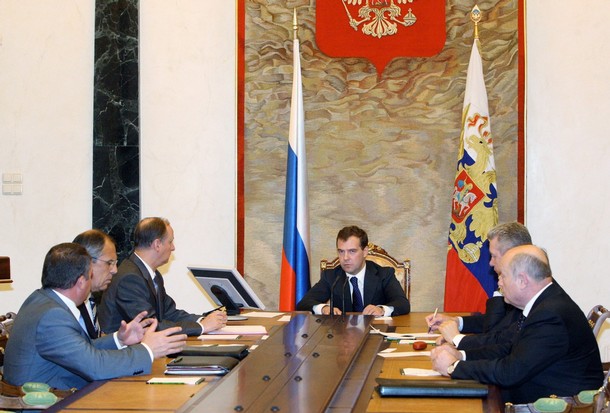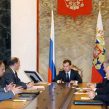
Russia’s Defense Modernization Without a Doctrine
Publication: Eurasia Daily Monitor Volume: 6 Issue: 58
By:

President Dmitry Medvedev chaired a Security Council meeting this week in the Kremlin, with Russia’s de facto ruler, Prime Minister Vladimir Putin, present, to consider a specific publicly stated agenda: the approval of the draft text of a new "National Security Strategy of the Russian Federation till 2020." The meeting ended in a fiasco, with Medvedev humiliated.
Opening the gathering, Medvedev stated that the previous official national security document – the National Security Concept- was approved in 1997 during the presidency of the late Boris Yeltsin. According to Medvedev, "Russia has changed, overstepping the transition period of the 1990s," the world has changed, "some old threats disappeared, while new ones emerged." Medvedev praised the new strategy for being a "fundamental and complex public document" covering all possible aspects of security: social, economic, military and international. The text, stressed Medvedev, was discussed in the Russian regions, within the Moscow state bureaucracy and "authorized by all concerned departments." He called for the approval of the strategy together with two important supplements: The Foundation of Strategic Planning and the List of National Security Criterion. Medvedev emphasized that the appendixes will promote strategic planning on all levels, including municipalities and civil society, allowing the "formation of a vertical of strategic planning under the leadership of the head of state" (www.kremlin.ru, March 24).
The documents were presented by Security Council Secretary Nikolai Patrushev, who reported that work to replace the acting 1997 National Security Concept began in 2004-2006, ordered by Putin, but "because of different reasons," the task was not fulfilled. Last June under orders from Medvedev, this work was resumed. Patrushev stressed that the documents were amended and approved during widespread interdepartmental discussions and all the members of the Security Council endorsed the latest draft strategy. Patrushev announced that later this year follow up documents would be presented to the Security Council for signing into law by the President: the Military Doctrine, the Doctrine of Food Security of the Russian Federation until 2020, the Concept of State and National Policy of the Russian Federation until 2020. After Patrushev’s presentation, the press was ousted from the room and the Kremlin did not offer transcripts of the following discussion (www.kremlin.ru, March 24).
Medvedev and Patrushev got it wrong. The present National Security Concept is not the one signed by Yeltsin in 1997. In January 2000, days after Yeltsin resigned, Putin signed into law a revised version of the National Security Concept (Nezavisimoye voyennoye obozreniye, January 14, 2000). This gaffe underscores the utter bureaucratic worthlessness of the document: the President and Security Council secretary could have been actually looking up the older discharged copy instead of the revised one.
Medvedev and Patrushev’s presentations of the new security Strategy seem to imply that it is something of the same: a pompous and senseless document that covers everything and nothing much in particular. The real importance of the new security strategy is that the Security Council threw out the draft despite Medvedev’s pleading. After the Security Council meeting ended behind closed doors an embarrassed Patrushev told reporters that the approval of the strategy has been postponed for another month and that "although Security Council members had earlier endorsed the draft strategy, they made some proposals on its improvement "that must be taken into account." Patrushev added that many of the new proposals "were diametrically contradictory" (ITAR-TASS, March 24).
Under the Russian constitution, the Security Council is an advisory body to the Presidency. The decisions of the Security Council are implemented by presidential decree and the head of state may or may not, take into account the opinions of the Council members. All legal responsibility lies with the Presidency. Medvedev’s debacle with the strategy he emphatically endorsed, underlines the fact that he is a figurehead president with little real power at hand. It was reported in Moscow that the endorsement of the Security Strategy was postponed until Medvedev’s April Fool’s Day, summit in London with Barrack Obama, because relations with the U.S. may be "reset" and this may somehow change the Security Strategy (Kommersant, March 25). But a summit with a figurehead cannot bring a breakthrough. Medvedev may inform Obama about official Russian viewpoints, but he cannot change anything without consulting the de facto ruler Putin.
Today a radical military reform is underway in Russia on an ad hoc basis without a new military doctrine. Defense Ministry civilian adviser Vitaliy Shlikov contends that a new doctrine or strategy are not essential, since such public documents in Russia are almost exclusively used for public relations exercises. Our top military commander, the Chief of General Staff Army General Nikolai Makarov has in any case announced that the new military doctrine "will be basically the same as the one we have" (enacted by Putin in April 2000), so why fuss? (Interfax, February 22).
Since 2001, it has been frequently announced in Moscow that the new official defense and security documents are being prepared and will shortly be approved, but under Putin, this never happened. Apparently, this informality agrees with Putin’s highly personalized style of ruling and decision-making. Medvedev might be more inclined to follow traditional bureaucratic ways, or was indeed trying to erect his own "vertical of power," but got his fingers publicly burned.




